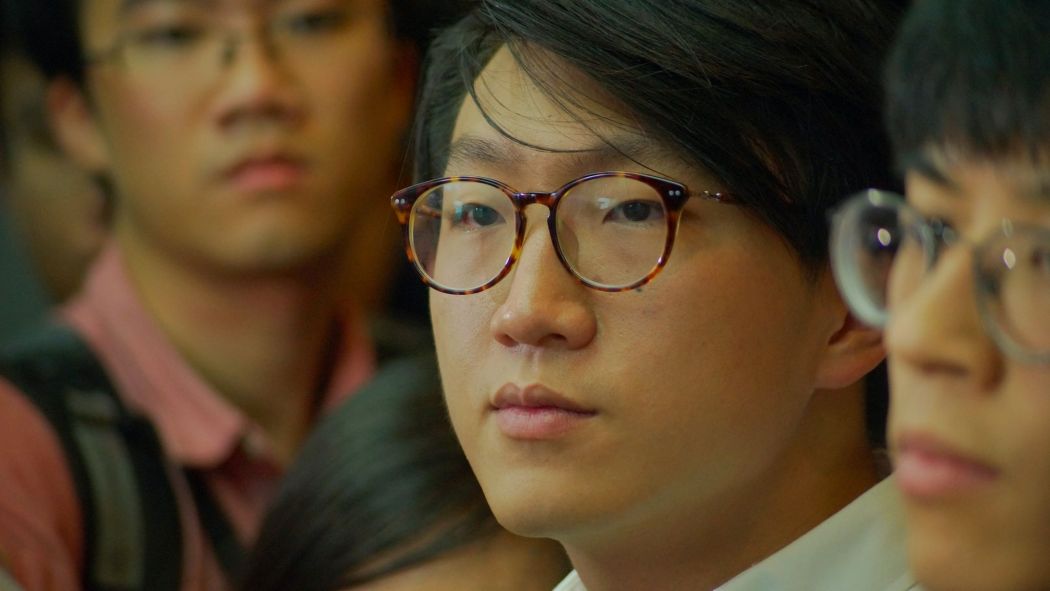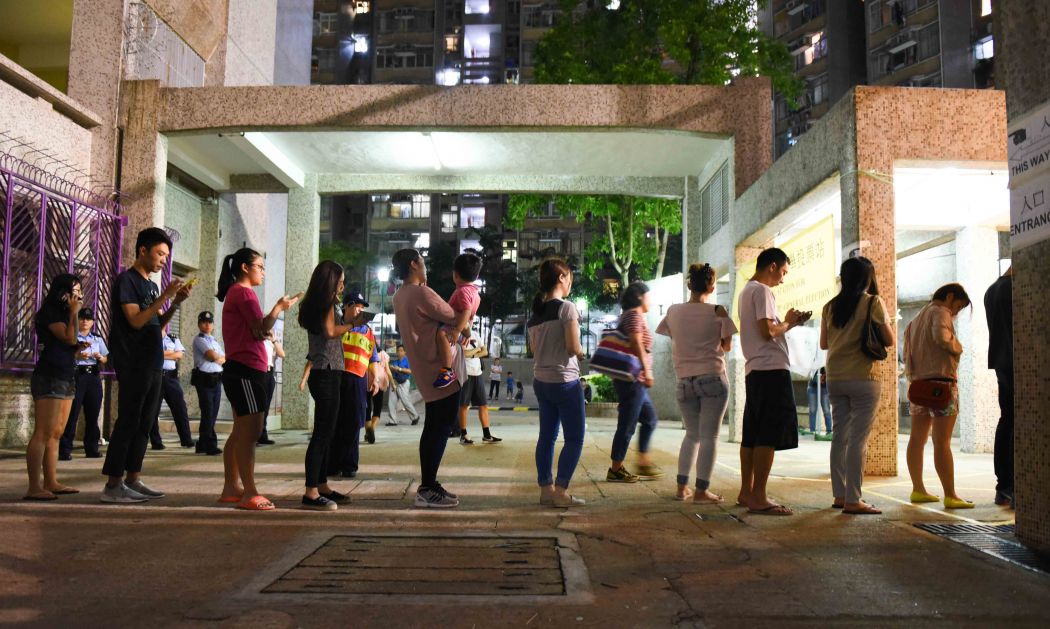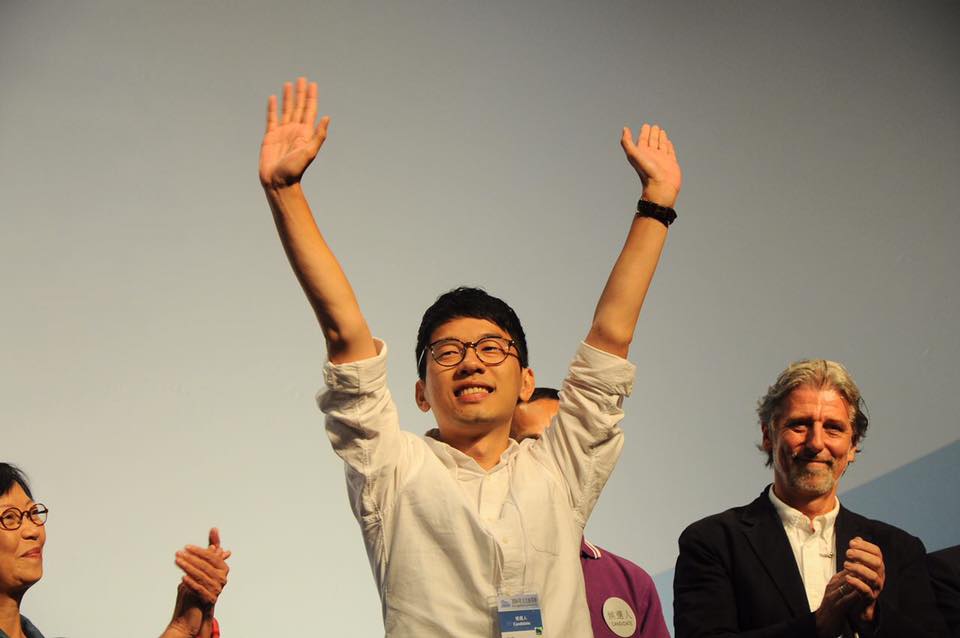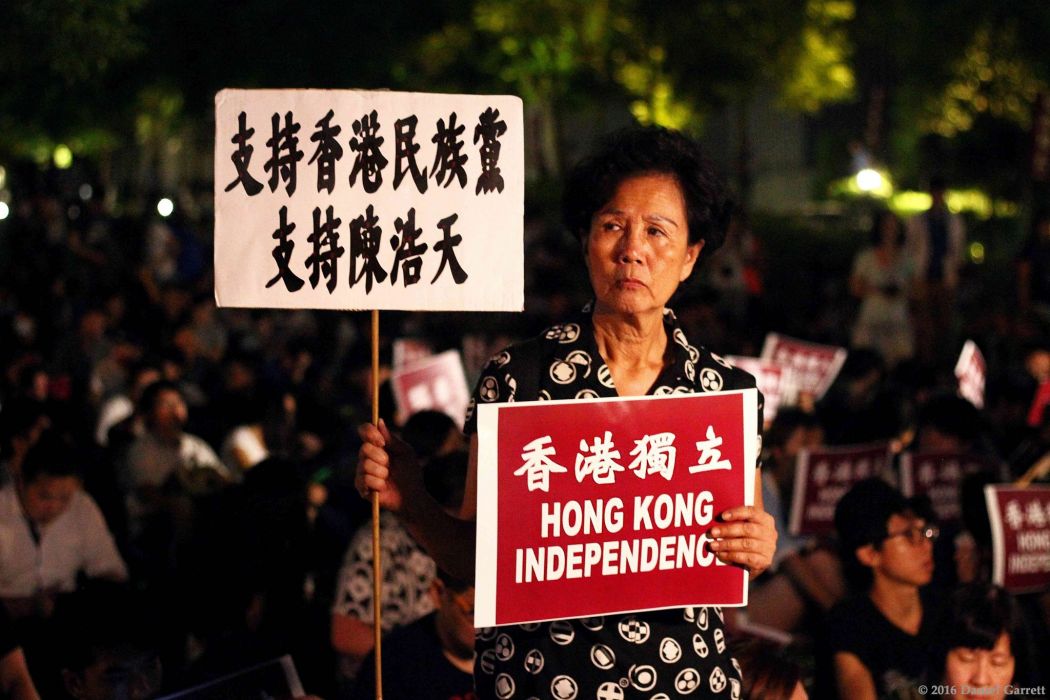When Hong Kong’s university students were planning strike action in September 2014, to protest at Beijing’s hardline rejection of Hong Kong’s electoral reform proposals, the students defended their decision by saying they knew their strike wouldn’t move Beijing. But they wanted to use their protest to “wake up” Hong Kongers.
They wanted to focus on the issue in question and use it to explain the importance of elections and voting, and why Beijing’s insistence on vetting candidates was not the way Hong Kong should conduct elections.

Then when their strike led to the Occupy street blockades and 79 days later, after public sympathy with their protest had long since waned, the students returned to their campuses dispirited by their failure.
They, and almost everyone who talks about that time, have continued to focus on failure because the occupiers had ultimately been forced to retreat with nothing to show for their effort.
Now it’s clear that they didn’t fail. The public was listening. It just took a while for the effect to register. And appropriately enough, the change in public attitudes can even be measured … not in any opinion poll but by the three elections that have been held since the last of the street blockades was cleared in December 2014.
Rebuilding confidence
The following summer, a few Occupiers resolved to test their insights and ideas by putting them to use in the November District Councils election. But so intimidated were these novice campaigners … by all the negative publicity surrounding the 79-day disruption to daily life they’d caused … that the Occupier candidates decided to play down their protest past.

They said they would only speak about it if asked. Otherwise they didn’t want to advertise themselves or volunteer anything about the Occupy experience unless their street-corner campaigning inspired direct questions from passersby.
They were as surprised as everyone else when they did far better than expected. Some had formed a new group they called Youngspiration 【青年新政】 and one of its members actually defeated an incumbent pro-establishment council chairman.
There were several other surprises, and near successes, and nothing to suggest anyone needed to hide their Occupy past. On the contrary, they were rewarded for it as voters learned about them and their backgrounds during the campaign. Rough estimates suggested these newcomer post-Occupy candidates received around 70,000 votes (Nov. 26, 2015 post).
Another surprise came from the February by-election held to fill the Legislative Council seat vacated by Ronny Tong in New Territories East. He had resigned in protest over what he saw as the excessive radicalism of the democracy movement as a whole, and resigned from the Civic Party as well.
Youngspiration initially said its members wanted to join the by-election race but then agreed to join all other pan-democrats in standing aside. They allowed the Civic Party’s choice to stand as the democratic camp’s sole candidate … rather than split the democratic vote and risk losing to the pro-Beijing competition.

Odd man out was a new post-Occupy name, Edward Leung Tin-kei, from a new group called Hong Kong Indigenous. They had some wildly radical ideas about “valiant” violent resistance and something that he didn’t actually call independence but that sounded very much like it to Beijing and the Hong Kong government’s election overseers.
They blocked his campaign pamphlets by refusing to allow their distribution by mail. He had to be satisfied with distributing them on street corners instead. And he refused to heed the democratic camp’s pleas to stand down.
Not only that but he and his friends deliberately provoked an episode of “valiant resistance” ostensibly to “protect” hawkers from police patrols at a Lunar New Year street market. What could be more offensive to Hong Kong sensibilities than violence on the first day of the Lunar New Year?!
Yet as his campaign unfolded, it became apparent that he had something to say and people were willing to listen. Against all custom and conventional wisdom, he received 66,000 votes, about 15% of the total cast in that election. And the Civic Party’s candidate won in spite of the votes Leung syphoned off the democracy camp’s share (Mar. 2 post)
Election day
For the post-Occupy generation, Hong Kong’s Legislative Council election succeeded beyond anyone’s expectations. Turnout was the highest ever recorded at 58% of registered voters. Some two million people cast their ballots last Sunday, September 4, and some of them had to wait in line until the small hours of Monday morning to accomplish their task.

Partly to blame about the expectations was the HKUPOP poll that seemed designed to enhance conservative prospects. The net impact of the day-to-day rolling poll for the month before the election was to strengthen the ratings of well-known pro-establishment conservatives and pro-Beijing candidates while leaving most of the unknowns and newcomers struggling to pass muster at the bottom of the pack (Aug. 29 post).
Then at the very end, on Election Day itself, came the unexpectedly disruptive effect of Benny Tai’s Thunderbolt Plan. Probably if Professor Tai gets any more bright ideas the founding father of Hong Kong’s Occupy movement is going to be treated to even more brickbats than his latest scheme has received since he introduced it early this year (June 27 post).
As his detractors acknowledged, at least he meant well. After his ideas about candidate and voter coordination fell on deaf democratic ears, his next idea was to encourage voters to think and choose strategically in terms of who could win rather than who they liked best. This isn’t a new idea.
A custom known as pei piao【配票】developed informally after the post-1997 government insisted on switching to proportional representation in order to guarantee success for what used to be disadvantaged pro-Beijing candidates. Family members and friends watch the polls and then just before Election Day get together and decide how best to divide up their votes to try and maximize the effect… for candidates most in need who can benefit most.

But Benny Tai had about 40,000 followers for his smart-phone Thunderbolt-Go scheme by Election Day and the effect was far more dramatic than the informal custom played out among family and friends.
Toward the end, he placed full-page ads in Apple Daily saying he was coordinating with the HKUPOP polling operation. But his scheme was initially intended to be a sharing of preferences among his own self-selected participants.
Then on Election Day itself, he sent out two messages, morning and evening, the first suggesting which candidates to abandon. In the evening, when he decided he had probably gone too far, he advised not to abandon them all after all.
Benny Tai owes everyone an explanation, which he tried to provide yesterday saying it didn’t go as he had planned. His Occupy Central idea didn’t turn out the way he planned either. Professor Tai is a law professor but he obviously hasn’t given much thought to the law of unintended consequences.
Meanwhile, the net result of all the uncertainties — unprecedented in degree due to the unprecedented number of candidates plus the multiple polling effects — was to write a premature end to many newcomers’ candidacies and many old-timers’ careers, and pave the way for a new generation of post-Occupy activists to make their presence felt in Hong Kong’s Legislative Council.

Among those abandoned were veterans of Hong Kong’s democracy movement who dated back to its beginnings: the Labour Party’s Lee Cheuk-yan and Cyd Ho, and Frederick Fung — long-time leader of the Association for Democracy and People’s Livelihood. All three are old generation grassroots activists.
Besides those who fell beneath Benny Tai’s bar, several of the superfluous candidates finally saw the light and withdrew of their own accord just days before the election. This, too, was unprecedented.
Those who stood down before Election Day included two Hong Kong Island candidates and three from the over-burdened super-seat lists. These last minute drop-outs did not include the Liberal Party’s Ken Chow, who had withdrawn from the race a few days earlier claiming candidate intimidation … also unprecedented. (Aug. 29 post).
A new generation
The most striking result, however, was the unanticipated success of five new-generation post-Occupy activists: one on Hong Kong Island; two for Kowloon West; and one each for New Territories East and West. They are all committed to Hong Kong localism in terms both of grassroots social concerns and political self-determination.
Some candidates advocating independence had already been officially disqualified (Aug 3 post). These included Edward Leung Tin-kei, who might actually have won a seat, according to the HKUPOP preliminary polling. By self-determination for Hong Kong the new breed of post-Occupy localists mean resisting the inroads of “mainlandization” … or mainland-style ways and means into Hong Kong’s political life.
How this new generation might set themselves apart from pre-Occupy generation activists of similar bent remains to be seen. But in terms of their political inclinations, they should augment the strength of five returning pre-Occupy radical legislators: Long-Hair Leung Kwok-hung, People Power’s Raymond Chan, the Civic Party’s Claudia Mo, Labour’s Fernando Cheung, and Civic Passion’s Cheng Chung-tai (new face, pre-Occupy party).

A second important result of the elections is that despite all the chaos the democratic camp was able to hold the line. Democrats … counting all varieties … not only held onto their one-third veto-proof minority but actually strengthened it: by all of one new seat in the Geographic Constituencies (Kowloon West), and two new Functional Constituency seats (medical and architecture). Unexpectedly, there were no losses (full lineup, all winning and losing lists, vote counts: SCMP, Sept. 6).
Nevertheless, as expected, the Legislative Council’s intricately crafted design and the organized strength of pro-Beijing forces kept actual changes to a minimum.
Total votes cast in the Geographic Constituencies were 2.2 million with 871,866 or 40.3% going to pro-establishment candidates, and 1,289,643 votes or 59.7% for pro-democracy candidates of all kinds. The latter included about 5% received by the new centrist splinter parties (Path of Democracy and Third Way), and 19% for the new localist post-Occupy candidates (calculated from official Electoral Affairs Commission statistics, Apple, SCMP, Sept. 7).
LegCo, 2012-16
| GEOGRAPHIC | 35 | 18 democrats | 17 others |
| FUNCTIONAL | 30 | 6 | 24 |
| SUPER-SEATS | 5 | 3 | 2 |
| TOTALS | 70 | 27 | 43 |
LegCo, 2016
| GEOGRAPHIC | 35 | 19 democrats | 16 others |
| FUNCTIONAL | 30 | 8 | 22 |
| SUPER-SEATS | 5 | 3 | 2 |
| TOTALS | 70 | 30 | 40 |

Post-election notes
In the end, Hong Kong Island bore only passing resemblance to the results anticipated by the HKUPOP poll (Aug. 29 post). Former Secretary for Security Regina Ip didn’t receive enough votes for two seats, although she did receive the highest vote total in the constituency.
More surprising was the fate of Ricky Wong with his popular ABC … “Anyone but CY” slogan. His ratings had held steady throughout the month of polling and he seemed a sure bet. Dislike for Chief Executive CY Leung may have been enough to win a thumbs up from respondents in passing. But when it came time to vote other considerations took hold. He received only 33,000 votes compared to her 60,000.
Perhaps it was his widely publicized performance during a televised forum where he called her, to her face, a “little piece of shit.” Or maybe once voters had more time to consider his platform they decided he wasn’t much of a democrat and his brand of businessman’s bravado wasn’t quite what they were looking for in a candidate.
Two other surprises came in the form of two pro-democracy candidates who had seemed to have no hope at all. The Democratic Party’s Ted Hui benefited from two kinds of promotion, one old the other new. His party raised the “emergency alarm,” alerting voters to his plight, and sent out two venerable surrogates to campaign on his behalf: Party founder Martin Lee and Anson Chan. Benny Tai also tapped him on Thunder-Go. He did the same for Nathan Law who at 23 has just become the youngest person ever to serve in Hong Kong’s Legislative Council.
Joshua Wong had wanted to run on the students’ new Demosisto party ticket but he isn’t old enough. So party convener Nathan Law ran instead. He is one of the three student leaders, including Wong, who have just been found guilty of the illegal assembly that precipitated the Occupy movement in 2014. But Law got off with community service and thus escaped the prison sentence that would at least temporarily have derailed his budding political career. HKI line-up: 3 pro-democracy; 3 pro-establishment.
In another first, Kowloon West is the first constituency ever to have an all-female line-up: 4 pro-democracy; 2 pro-establishment. The democrats include two incumbents and two new post-Occupy localists. The incumbents: Claudia Mo, Civic Party; and Helena Wong, Democratic Party. Post-Occupy localists: the popular “Teacher” Lau Siu-lai and Youngspiration favorite Yau Wai-ching, one of the original young candidates who set the pace in last November’s District Councils election.

But even more noteworthy in Kowloon West is who isn’t there: Raymond “Mad Dog” Wong Yuk-man. He was running for re-election and the rebellion against him that flared during an election forum (Aug. 29 post) continued afterward. Spearheading the revolt was another KNW candidate, Jonathan Ho Chi-kwong, from a group calling itself Hong Kong Localism Power with virtually no following in the district. He won only 399 votes.
Among other things, Jonathan Ho took out full page ads in Apple Daily listing all the grievances against Wong and urging people not to cast even a single vote for him. Among the many sins listed was his support for Civic Passion’s successful bid to defeat Albert Ho in last year’s District Councils election, thus paving the path upward for hardline pro-Beijing lawyer Junius Ho. In defeat, Wong didn’t try to deflect blame. He said he had made too many enemies..
Kowloon East is locked in place, so much so that pre-election polling for this district reflected perfectly what the results would be: 3 pro-establishment; 2 democrats. Civic Passion’s Wong Yeung-tat made a valiant attempt to break the mold but failed again, as have others before him. KNE is now home base for pro-Beijing forces. They have enough votes for at least three seats and can always see to it that their candidates receive the support necessary to secure election.
One reason observers had difficulty predicting the outcome in New Territories West was that most people in town don’t keep up with suburban/rural politics. Consequently everyone missed the biggest rising star of the entire election, Eddie Chu Hoi-dick. He won the title “King of Votes” for receiving the highest number: 84,121.
Chu is a rural reformer and environmentalist who heads a group called Land Justice League. He’s also a former Ming Pao Daily investigative journalist who has declared the powerful rural council, the Heung Yee Kuk with all its land-owning rural kingpins, to be his main target.
One of their friends is the pro-Beijing lawyer Junius Ho who also succeeded in his bid to represent NTW. He was honest enough to thank Beijing’s liaison office for its help in supporting his campaign (Apple, Sept. 6).

Something about the nature of the help he received is also now known, thanks to the Liberal Party’s Ken Chow who claimed he had been threatened and dropped out of the race just days before the election. Part of the story he has just told concerns the liaison office’s preference for Junius Ho (Apple, Standard, Sept. 8). The line-up in NTW remains the same as before: 5 pro-establishment; 4 democrats.
New Territories East also retains the same balance as before: 3 pro-establishment; 6 democrats. This district is home to “Long Hair” Leung Kwok-hung; the Labour Party’s sole remaining legislator, Fernando Cheung; the Civic Party’s Alvin Yeung who remains in the seat vacated by Ronny Tong; and People Power’s Raymond Chan, Hong Kong’s only openly gay legislator.
NTE has also just elected Youngspiration candidate Baggio Leung, friend of disqualified Hong Kong Indigenous independence campaigner Edward Leung Tin-kei. The two Leungs campaigned together.
What next?
Hong Kong’s 2016 Legislative Council may look almost the same — only a handful of seats won and lost here and there — but it’s a very different place from what it was before. The young localist post-Occupy candidates, together with their banned pro-independence counterparts, have put the question of Hong Kong’s relationship with its new sovereign at the top of the public agenda.
And they’ve done it in a way that Beijing will not be able to address with its old familiar formula: uniting with those who can be won over by whatever means, and drawing clear lines against everyone else.
Those old techniques are supposed to produce automatic deference to Beijing’s sovereign authority … as they might have done had Beijing felt free to exercise the hard-power enforcement mechanisms that can ensure compliance. Some old conservative onlookers here know those rules and warn about the danger of trying Beijing’s patience.

But the younger generation … that has grown up during the last 30 years since the terms of Hong Kong’s return to China were written … don’t live by the old rules. And they know that for now, while those terms are still acknowledged in name if not always in fact, they can still push back to protest the disconnect between what Hong Kong thought and what Beijing meant by those terms.
They also calculate that it might be their last chance to push back and they are now determined to make their case as direct and as public as possible.
Real independence is not an option. Almost everyone understands and accepts that fact even if they don’t like it. But the independence advocated by the banned candidates has become a code word, a rhetorical device useful in spotlighting and identifying all that’s wrong with the Beijing-Hong Kong relationship.
The new localist candidates who were not banned use another term: self-determination. Beijing is trying to tar them all with the same brush. But it can’t mask the reality of what’s wrong with the relationship.
And Beijing is right in suggesting that both kinds of candidates are talking about the same thing, namely, the clash between Hong Kong and mainland ways and the ever increasing impact of the latter on Hong Kong political life.

Those intrusions are everywhere now: mainland liaison office officials openly coordinating election candidates, the alleged intimidation of candidate Ken Chow, the experience of the cross-border booksellers, patriotic education for all students, Beijing’s August 31, 2014 mandate on mainland-style electoral reform, Beijing’s 2014 White Paper spelling out its concept of comprehensive sovereignty, Article 23 national political security legislation, and so on. It’s a slow steady takeover not just from above and below but from within as well.
So strong has the backlash become, in fact, that the main “traditional” pro-democracy parties (Democratic Party, Civic Party, Labour Party, Association for Democracy and People’s Livelihood) have all endorsed the self-determination idea. It is no longer “radical” advocacy … except in Beijing’s eyes.
The 2016-2020 Legislative Council will not be a tranquil sanctuary, despite the absence of master trouble-maker Raymond Wong Yuk-man. In his place will be several others who can multiply his effect many times over.
Their aim now is not to “wake up” Hong Kongers but something even more difficult: to convince Beijing that the terms of its engagement with Hong Kong need to be conducted in a way that allows Hong Kong the autonomy it thought it was going to receive after the British left in 1997.
